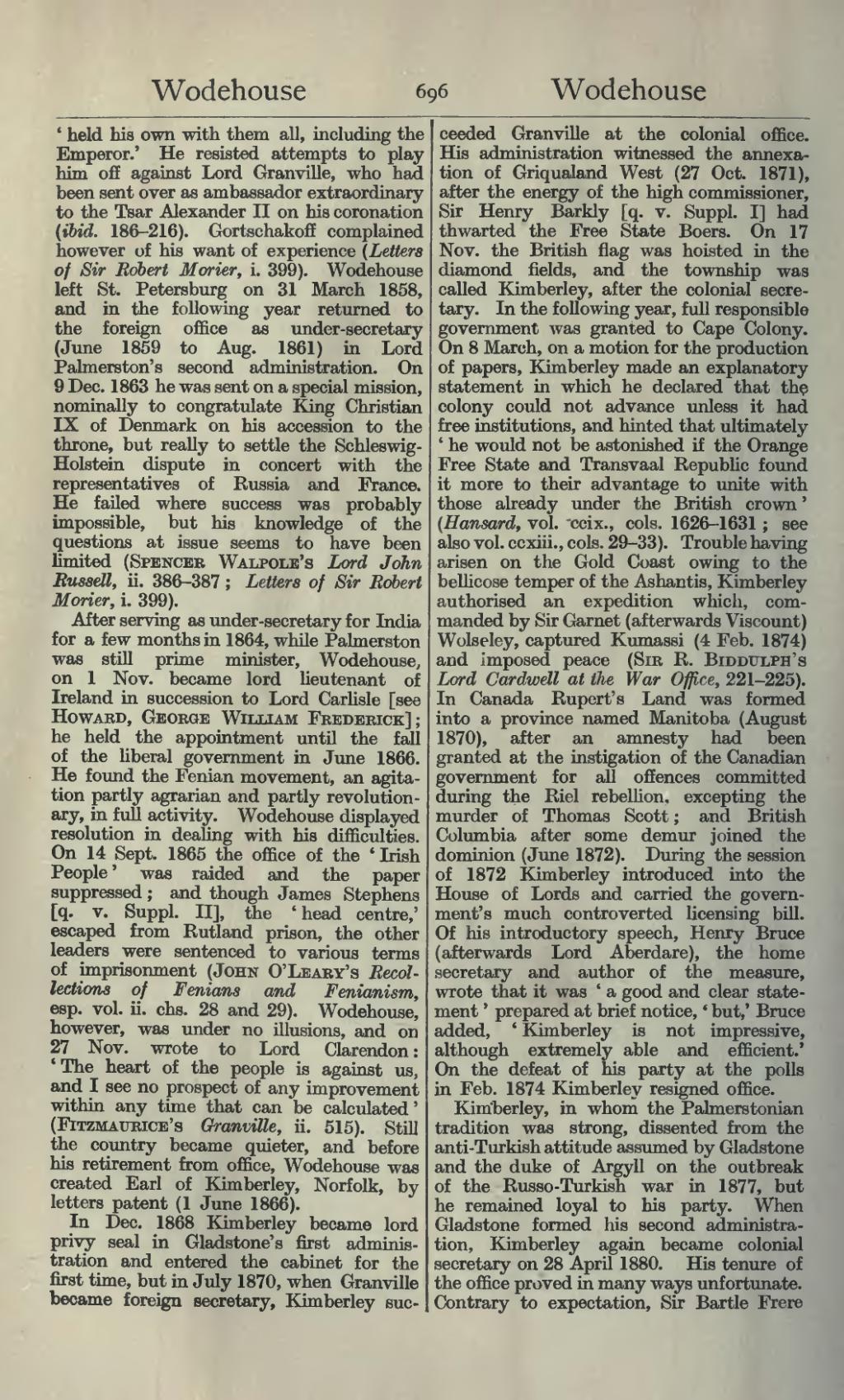‘held his own with them all, including the Emperor.’ He resisted attempts to play him off against Lord Granville, who had been sent over as ambassador extraordinary to the Tsar Alexander II on his coronation (ibid. 186–216). Gortschakoff complained however of his want of experience (Letters of Sir Robert Morier, i. 399). Wodehouse left St. Petersburg on 31 March 1858, and in the following year returned to the foreign office as under-secretary (June 1859 to Aug. 1861) in Lord Palmerston's second administration. On 9 Dec. 1863 he was sent on a special mission, nominally to congratulate King Christian IX of Denmark on his accession to the throne, but really to settle the Schleswig-Holstein dispute in concert with the representatives of Russia and France. He failed where success was probably impossible, but his knowledge of the questions at issue seems to have been limited (Spencer Walpole's Lord John Russell, ii. 386–387; Letters of Sir Robert Morier, i. 399).
After serving as under-secretary for India for a few months in 1864, while Palmerston was still prime minister, Wodehouse, on 1 Nov. became lord lieutenant of Ireland in succession to Lord Carlisle [see Howard, George William Frederick]; he held the appointment until the fall of the liberal government in June 1866. He found the Fenian movement, an agitation partly agrarian and partly revolutionary, in full activity. Wodehouse displayed resolution in dealing with his difficulties. On 14 Sept. 1865 the office of the ‘Irish People’ was raided and the paper suppressed; and though James Stephens [q. v. Suppl. II], the ‘head centre,’ escaped from Rutland prison, the other leaders were sentenced to various terms of imprisonment (John O'Leary's Recollections of Fenians and Fenianism, esp. vol. ii. chs. 28 and 29). Wodehouse, however, was under no illusions, and on 27 Nov. wrote to Lord Clarendon: ‘The heart of the people is against us, and I see no prospect of any improvement within any time that can be calculated’ (Fitzmaurice's Granville, ii. 515). Still the country became quieter, and before his retirement from office, Wodehouse was created Earl of Kimberley, Norfolk, by letters patent (1 June 1866).
In Dec. 1868 Kimberley became lord privy seal in Gladstone's first administration and entered the cabinet for the first time, but in July 1870, when Granville became foreign secretary, Kimberley succeeded Granville at the colonial office. His administration witnessed the annexation of Griqualand West (27 Oct. 1871), after the energy of the high commissioner, Sir Henry Barkly [q. v. Suppl. I] had thwarted the Free State Boers. On 17 Nov. the British flag was hoisted in the diamond fields, and the township was called Kimberley, after the colonial secretary. In the following year, full responsible government was granted to Cape Colony. On 8 March, on a motion for the production of papers, Kimberley made an explanatory statement in which he declared that the colony could not advance unless it had free institutions, and hinted that ultimately ‘he would not be astonished if the Orange Free State and Transvaal Republic found it more to their advantage to unite with those already under the British crown’ (Hansard, vol. ccix., cols. 1626–1631; see also vol. ccxiii., cols. 29–33). Trouble having arisen on the Gold Coast owing to the bellicose temper of the Ashantis, Kimberley authorised an expedition which, commanded by Sir Garnet (afterwards Viscount) Wolseley, captured Kumassi (4 Feb. 1874) and imposed peace (Sir R. Biddulph's Lord Cardwell at the War Office, 221–225). In Canada Rupert's Land was formed into a province named Manitoba (August 1870), after an amnesty had been granted at the instigation of the Canadian government for all offences committed during the Riel rebellion, excepting the murder of Thomas Scott; and British Columbia after some demur joined the dominion (June 1872). During the session of 1872 Kimberley introduced into the House of Lords and carried the government's much controverted licensing bill. Of his introductory speech, Henry Bruce (afterwards Lord Aberdare), the home secretary and author of the measure, wrote that it was ‘a good and clear statement’ prepared at brief notice, ‘but,’ Bruce added, ‘Kimberley is not impressive, although extremely able and efficient.’ On the defeat of his party at the polls in Feb. 1874 Kimberley resigned office.
Kimberley, in whom the Palmerstonian tradition was strong, dissented from the anti-Turkish attitude assumed by Gladstone and the duke of Argyll on the outbreak of the Russo-Turkish war in 1877, but he remained loyal to his party. When Gladstone formed his second administration, Kimberley again became colonial secretary on 28 April 1880. His tenure of the office proved in many ways unfortunate. Contrary to expectation, Sir Bartle Frere
